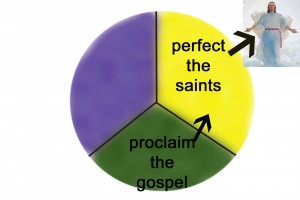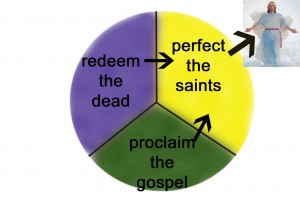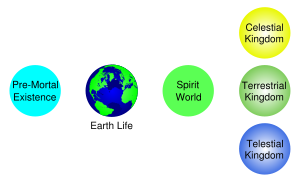Q. Do Mormons believe that people have the potential to become the kind of God that made the heavens and the earth? Do Mormons believe that before the God who made the heavens and the earth was God, he was a human?
In other parts of this blog, it has been put forward that we are to be like Christ and our Father in Heaven and that is our purpose in this life. What is less clear, is exactly what that entails. What we do know is that our Father has promised us everything He has. John’s revelation shows that here and here. Modern revelation also confirms this.
Elsewhere in scripture, Christ speaks of the many mansions in His Father’s house and that He has prepared them for us (John 14:2). In the parables of the faithful steward (Luke 12:42-44) and the prodigal son (Luke 15:31), the faithful steward of the first and faithful son of the second are promised all that the Lord has and ruling power over it.
Even more important than what we receive is who we will become. Christ commanded us to become perfect, even as our Father in Heaven is perfect. As we endeavor to fulfill this commandment throughout our lives, we can indeed progress nearer to godliness. Christ’s atonement makes this possible. This process is the main purpose of our life and to which the majority of the scriptures are devoted.
We also can receive all that is our Father’s (for isn’t infinite power and glory divided a trillion times still infinite?) once we have proven ourselves worthy of such a great responsibility. What specific duties and activities that will entail are currently unknown but since God’s work and glory are to bring to pass our own immortality and eternal life, we ought to work to that end in an ever increasing scope.
As for our Heavenly Father’s origins, there is less clarity in the subject but it does follow that since we are His children and offspring, then our potential is equal to His and our origins similar. My own opinion is that He was more like Christ than any other man of this earth. “Then answered Jesus and said unto them, Verily, verily, I say unto you, The Son can do nothing of himself, but what he seeth the Father do: for what things soever he doeth, these also doeth the Son likewise.” John 5:19
In the end, God, our Heavenly Father, wishes to foster our growth and happiness. He has given us unlimited potential, opportunities to take advantage of it and agency to decide for ourselves. And it is through Jesus Christ that we can overcome our shortcomings to live and to grow. This is the plan that was created for our benefit and no doubt we will continue to fulfill our potential even after this life.
 Q. Was He [Jesus] married?
Q. Was He [Jesus] married? As a teenager, one of the things we were taught over and over was that the Church had a three-fold mission:
As a teenager, one of the things we were taught over and over was that the Church had a three-fold mission: 



 Those in the Celestial Kingdom
Those in the Celestial Kingdom 